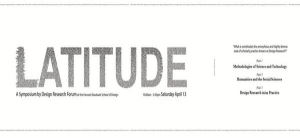Greetings from the Master in Design Studies (MDes) Program at the GSD
Dear MDes Alumni,
It’s a privilege to write to Master of Design Studies (MDes) alumni as Program Director. These are exciting times to be leading the program—this has been a year of productive change for the advanced studies program, which has evolved and grown considerably over its 30-year history. With 170 students enrolled, 76 of those starting this year, MDes has reached a new high in terms of both enrollment and influence. To ensure our relevance, bolster the program’s quality, and meet the needs of our diverse student population, we have made several significant improvements this year.
First, we restructured the degree to offer two paths: a 3 or 4-semester coursework degree, and a 4-semester coursework plus thesis program. In this first year operating under the new model, we have far fewer thesis candidates than previous years: 38 this year versus 80 last year. While many students elected this direction over the thesis path, the students who have elected to complete a thesis are better supported with expanded access to faculty and resources.
Second, and perhaps even more impactful, we debuted a new MDes thesis workspace in the Arthur M. Sackler Museum that is located at 485 Broadway, just across the street from Gund Hall. For the first time ever, MDes thesis students are enjoying desk space, lockable storage, a dedicated shop & projection equipment, as well as a small lounge. Eventually, I hope to offer space to the entire program.
Finally, ongoing refinements to our eight areas of concentration ensure that the program reflects the world around us and leverages the expertise of our faculty. We are continuing to work on and revise our areas to reflect emerging realities and anticipate further changes in the near future to respond to the growing demand of these areas which may benefit from further subdivision.
With these internal refinements in place, we are eagerly looking outward to create external initiatives that support student research. By partnering with firms and industry, we hope to create fieldwork opportunities for students that allow them to further their research through funded, topic-specific workshops, internships, or trips. Stay tuned for upcoming announcements on this front.
While all concentrations are thriving, Art, Design, and the Public Domain (ADPD) had an especially robust fall. In an effort to respond to a growing interest in “making,” MDes launched a new seminar course for 2nd year ADPD students. “MAKE/BELIEVE,” co-taught by Dan Borelli MDes ’12 and Rebecca Uchill, is a hybrid production-theory course that emphasizes project-based inquiries focused on the intersections of materiality, expression, and public engagement. ADPD also welcomed Malkit Shoshan, founder and director of FAST: Foundation for Achieving Seamless Territory and lecturer in Urban Planning and Design, to join Krzysztof Wodiczko as ADPD Area Head.
 We are delighted that the student-formed Design Research Forum (DRF) organized a spring symposium entitled Latitude: A Forum on Design Research on April 13, 2019. The one-day event comprised three panels of invited speakers, GSD faculty, and MDes students, each investigating distinct spheres of design research: “Humanities and the Social Sciences;” “Methodologies of Science and Technology;” and “Design Research in/as Practice.” DRF was conceived and founded as a compliment to the MDes program by students seeking a venue to test and workshop ideas, methodologies, analyses, and works in progress.
We are delighted that the student-formed Design Research Forum (DRF) organized a spring symposium entitled Latitude: A Forum on Design Research on April 13, 2019. The one-day event comprised three panels of invited speakers, GSD faculty, and MDes students, each investigating distinct spheres of design research: “Humanities and the Social Sciences;” “Methodologies of Science and Technology;” and “Design Research in/as Practice.” DRF was conceived and founded as a compliment to the MDes program by students seeking a venue to test and workshop ideas, methodologies, analyses, and works in progress.

MDes also hosted three major lectures this year that provided new perspectives on design, reaching beyond the traditional boundaries of the School’s core disciplines. At November’s Open House, we welcomed the internationally renowned graphic designer Irma Boom. A regular collaborator with Rem Koolhaas, Boom pronounced her obsession with books and defended their significance in the digital age. Also in November, we hosted the ever-provocative Jan Boelen for the Margaret McCurry Lectureship in the Design Arts to speak on the topic of “Design as Learning,” encouraging students to consider everyday objects in a novel manner. In March, we welcomed distinguished humanities scholar Rosi Braidotti from the Netherlands to deliver “Posthuman Knowledge,” in conjunction with Women in Design. We are delighted to have had such notable provocateurs as part of our lecture series (speakers pictured above left to right in order of mention).
While I am certain that your practice is as busy and full as our calendar, we would be honored to have you visit campus for a lecture, or join us at one of the great upcoming alumni events! Stay in touch.
Warm Regards,
John May MArch ’02
Director of the Master in Design Studies Program
Assistant Professor of Architecture
